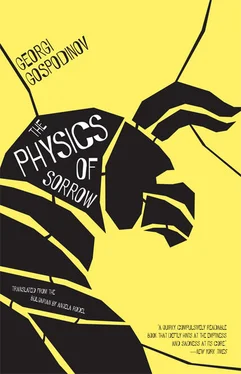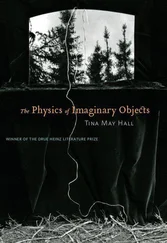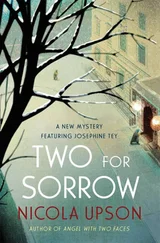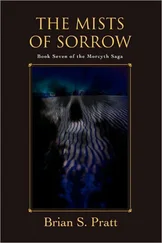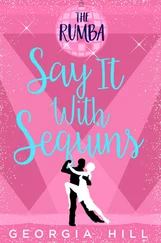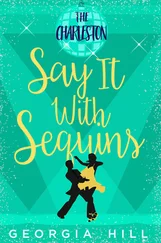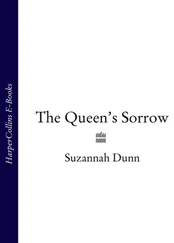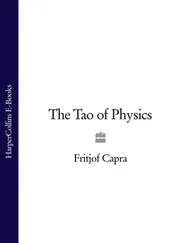At that moment, the Minotaur finds his mother in the crowd at the bullfight, my three-year-old grandfather sees his mother running back toward the mill,
a woman in Harkany receives a letter,
a man steps out of a poster, goes over to Juliet in front of the movie theater and the two of them set off arm-in-arm down the main street of T.,
Gaustine installs the biggest projector in the world and a night rain that doesn’t get anything wet falls over the whole northern hemisphere,
my father and mother are watching from the balcony of a lit-up apartment on the top floor.
the girl and I are now on the same side of the beam of light, I see the edge of her face, she turns around.
Hi, Daddy.
I died (left for Hungary) in late January 1995 as an eighty-two-year-old human being of the male sex. I don’t know the exact date. It’s best to die in the winter, when there’s not much work, so you don’t cause too much trouble.
I died as a fruit fly, at dusk. The sunset of the day (of my life) was beautiful.
I died on December 7, 2058, as a human being of the male sex. I don’t remember anything from that year. That’s why I recalled the year I was born, 1968, day by day.
I have always been dead. And it’s always been dark. If death is darkness and the absence of others.
I haven’t died yet. I’m forthcoming. I am minus three months old. I don’t know how to count that negative time in the womb. It’s dark and cozy here, I’m tied to something that moves. In three months, I’ll pass beyond to the outside. Some call that death birth.
I died on February 1, 2026, as a human being of the male sex. My father was always telling me that it was best to die in winter, I listened to him. I was a veterinarian my whole life. I once went to Finland.
I remember dying as a slug, as a rose bush, a partridge, as Ginkgo biloba , a cloud in June (that memory is brief), a purple autumnal crocus near Halensee, an early-blooming cherry frozen by a late April snow, as snow freezing a hoodwinked cherry tree.
We was.
My father and the dinosaurs died out at the same time.

This book was written in various places. It began near the Wannsee at the Literarisches Colloquium Berlin, where I had all the tranquility and sunsets in the world at my disposal; it continued on the banks of the Danube in Krems (Literaturhaus NÖ), the Wachau Valley in Lower Austria, between the river and the strictest Austrian prison; the final I’s were dotted and T’s crossed on the Adriatic, in Split (thanks to an invitation from KURS), in the labyrinth of Diocletian’s Palace. I am grateful to the benevolent geography and my hosts in these places.
Thanks to Ani Burova, Nadezhda Radulova, Boyko Penchev, Miglena Nikolchina, Bozhana Apostolova, and Silvia Choleva for their valuable advice.
I thank Ivan Teofilov for his encouragement and shared faith in the wonder of language.
Thanks to Bilyana, who read and edited before there was even a book, and to four-year-old Raya for her patience and willingness to offer a story about cats and dinosaurs whenever she sensed that I was stuck.
Thanks to everyone who secured me the solitude necessary for a novel.
Georgi Gospodinov (1968) is a poet, writer, and playwright, and one of the most translated Bulgarian authors after 1989. His Natural Novel is published in twenty-three languages (in the U.S. by Dalkey Archive) and was praised by the New Yorker, New York Times, Guardian, Believer , and Village Voice , among others. A collection of his short stories, And Other Stories , was published by Northwestern University Press. The Physics of Sorrow , his second novel, is a finalist for four International European Prizes in Italy and Germany, among them Premio Strega Europeo and Haus der Kulturen der Welt Preis.
Angela Rodel earned an MA in linguistics from UCLA and received a Fulbright Fellowship to study and learn Bulgarian. In 2010, she won a PEN Translation Fund Grant for Georgi Tenev’s short story collection. She is one of the most prolific translators of Bulgarian literature working today and received an NEA Fellowship for her translation of Gospodinov’s The Physics of Sorrow .
Myth is the nothing that is everything.
